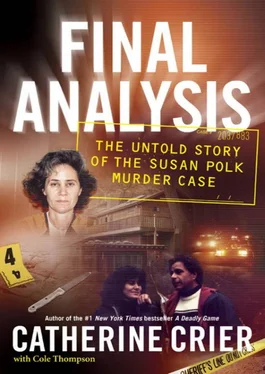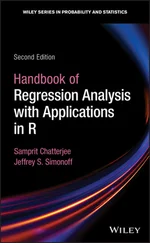“What happened to me could happen to any family,” Susan said. “The D.A. will have you believe that I was controlling…that I was a Lolita.”
This was a case of systematic spousal abuse that had gone on for far too long. To Susan, the events were clear: she had not killed Felix that night in the guest cottage; he had a heart attack. Further clouding his death was the conspiracy that she alluded to concerning her family members and law enforcement.
During the final minutes of her remarks, Susan revisited the parallels found in literature. Jurors had heard only one side of the story, but before they could truly pass judgment, before they could decide her fate, they had to hear her version of the twenty-four years. When that happens, “it will be up to you to write the ending.”
Jurors immediately took a liking to Susan’s mother, Helen Bolling. Petite and high-spirited, Helen had the panel in hysterics with her humorous responses to Susan’s questions. Barely five feet tall, she almost disappeared in the witness chair beneath the judge. Clutching her daughter’s childhood writings, school assignments, and photos, Helen adjusted herself in the seat and waited for Susan to begin.
“You’ve only been married once?” her daughter asked, referring to Helen’s marriage to her father, Theodore Bolling.
“Oh yes, once was enough, it cured me,” Helen cracked, as the courtroom erupted into laughter. Susan’s seventy-three-year-old mother grinned as she told jurors that she was “almost a virgin” when she married Bolling. “You know what I mean,” she smiled.
During her testimony, Helen boasted of her daughter’s creativity and imagination. Her pale blue eyes sparkled with pride as she pulled out the awards, prize-winning writings, and photographs of Susan’s youth that she brought to court that day. Her props, and the homespun stories that accompanied them, provided jurors their first glimpse into the tender side of Susan Polk—a side that most had not witnessed in the courtroom.
“Did you see any signs that I was going to grow up like the D.A. says, a homicidal.”
Helen interrupted her daughter mid-sentence. “No.”
Helen did not hold back her dislike of her son-in-law, and in defense of Susan, told the story of her own life-and-death encounter. While she did not identify her attacker, who had throttled her violently, she described how she had to react in an instant to save her life. Helen “played dead” to thwart the attack, but her daughter had not been as fortunate. Susan had no choice but to resort to violence against Felix’s onslaught, she said.
“Boo-boo Susie” as she lovingly referred to her daughter, was not the violent type. Helen maintained that Susan didn’t have it in her to deliberately harm anyone. As far as she was concerned, it was her son-in-law who had provoked the assault.
She claimed Felix “had an exterior of being acceptable. Hidden under that, is all that shit. Excuse me, I beg the court’s forgiveness, that’s not proper language.”
Helen drew a deep breath before completing her thought. “Felix had a way of persuading you into thinking he was a good guy.”
She told jurors Susan had attempted suicide shortly after beginning therapy with Felix but provided few details.
When asked about the possibility that Susan could have been behind the allegations of the ritualistic sexual abuse of Adam and Gabriel, Helen balked. “That was from Felix. It didn’t come from my side of the family. When we hear about Satan, we run like hell.”
On cross-examination, Helen told Sequeira that her “falling out” with Susan happened over time. She denied accusations that she and her husband had abused their daughter during her childhood. “Absolutely not!” she replied. But Sequeira pressed the issue, wanting to know why Susan would make such claims during her police interrogation on the night of her arrest.
Helen sat poker-faced as the prosecutor played the videotape of that portion of the interrogation for jurors. “Maybe when she gets angry at people, she has a falling out with them, she makes up things about them. If she did it to you, she did it to Felix, too.”
Susan jumped up and objected. “Torture of my mom on the stand. It’s not right.” Her repeated protests were overruled by Brady.
Helen continued to defend her daughter, even after viewing the video clip in which Susan called her father a “pervert” and accused her mother of abusing her. She argued that Susan was a victim of Felix’s mind control and was just spitting back beliefs that he had drilled into her. Proof of this was the fact that now, almost four years after his death, Susan no longer believed her parents abused her during her childhood.
On redirect, Helen said she forgave Susan for “the lost years.”
“Of course, you’re my daughter. You’ll be my daughter until my last breath. Furthermore, I think people are placing too much blame on you.”
Susan’s mother expressed disappointment with her grandsons Adam and Gabriel, accusing the boys of being concerned only with themselves in the days and weeks after their father’s death. She described them with their “palms up,” implying that they were looking for money.
Outside court, Helen continued to defend her daughter. “All I have to say is you live practically as a hostage for forty-eight years, and then let’s see how you do.”
In retrospect, Helen would be seen as Susan’s best witness. Her testimony gave a fascinating look into the early years of Susan’s relationship with Felix. In order to win this case, Susan had to convince the jury of the profoundly disturbing psychological impact of Felix’s seduction. Since she was the only witness who could testify to Susan’s behavior before and after she met Felix, Helen was in a unique position to provide insight into the unhealthy relationship between the couple. Her charm and straightforward manner made her words convincing, but with so much of the trial remaining, it was unclear what impact this testimony would have on the verdict.
At 4:30 PM, with Helen’s testimony concluded, Judge Brady suggested they adjourn for the day and put off Eli’s testimony until the next morning, but Susan insisted that her son had been waiting in a holding cell all day, and she wanted to use her remaining time to begin her direct testimony. Ten minutes later, a clean-shaven Eli strolled into the courtroom. Susan broke into tears immediately. Her son was wearing the county’s bright yellow jumpsuit, but his hands and feet were not shackled. Taller and broader than his two brothers, Eli also possessed his mother’s angular features and strong jaw.
“On the whole, did you have a happy childhood?” Susan asked him when he took the stand.
“For the most part, yes.” Eli pulled out a letter he had written to his mother in November 2002 and read it aloud:
Dear Mom,
I miss you a lot. Whatever happens, I will always hold close what you taught me…. Going to Dad’s funeral this Saturday. I don’t think I am going to say anything. What could I possibly say? Nothing good.
Jurors looked on as Eli’s eyes welled with tears and he began to cry. “I pray that one day I will have control over my life,” he read between sobs. “I want so badly to tell you not to change… but jail changes a lot of people.”
The following morning, Eli was back on the stand describing the time he “split his mother’s lip,” testifying that he “threw a punch” at his mom after he found her crying in her bedroom, with his dad by her side.
“I’ll kill you, I could just kill you, Susan,” Eli claimed he heard Felix threaten. “It just popped into my head. Next thing I knew, I was throwing a punch.”
Eli claimed the incident followed a violent display by his father, who, he said, had dragged his mother up the stairs to the bedroom by her hair. Later, Felix rewarded Eli for punching his mother by taking him out to dinner at a Japanese restaurant. “It’s not your fault, it’s her fault,” Eli claimed his father told him after the incident, which sent Susan to the emergency room for stitches.
Читать дальше











